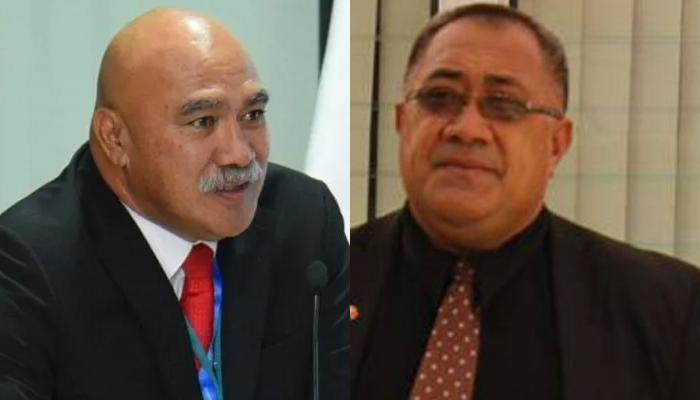Warning: This article contains culturally sensitive Tongan phrases with provocative double meanings that some readers may find offensive.
Analysis – The heated exchange that turned into a “physical altercation” in Tonga’s Parliament this week reveals how deeply language and power intertwine in the kingdom’s political culture.

The tensions flared in Parliament as Whole House Committee Chair Lord Tu’ilakepa clashed with Police Minister Piveni Piukala during debate on an anti-money laundering amendment. The proposed changes to the Money Laundering and Proceeds of Crime Act, originally submitted by Law Minister Mo’ale Finau, became the flashpoint for a heated exchange between the noble and the Minister.
The two leaders’ strained relationship often turned volatile in Parliament, with clashes erupting even over matters beyond their official portfolios.
At the centre of their clash on Monday were two phrases that carry far more weight than their literal translations suggest.
Weaponising Language in Parliament
When Lord Tu’ilakepa told the Minister of Police to moderate his tone, he also warned him in Tongan: “Na’a homo ho le’o,” a deployment of what appeared to be carefully chosen words with explosive cultural resonance.
While the phrase technically means “be careful, otherwise your voice will come out,” it represents an unusual combination of homo and le’o. Typically, the use of the word “homo” in conflict is explicitly provocative in nature, given the vulgar terms it usually combines with.
For clarity, the term, when deployed in an altercation, evokes vulgar Tongan expressions like “homo ho l***” – where the obscured word l*** refers to the rectum. Unlike in English, where rectum functions as a clinical term, in Tongan, this word constitutes a deeply offensive swear word.
The Minister of Police’s response—“Ke tuku e kaikaila kae ’ai e hā?” (literally to stop yelling and do what?)—to Lord Tu’ilakepa’s warning to lower his voice, was inherently provocative, signalling his readiness to escalate the confrontation.
This incident lays bare Tonga’s intricate interplay of linguistic nuance and social hierarchy, where communication operates through layered registers that simultaneously enforce faka’apa’apa (respect intertwined with sacred taboo) and fatongia (status-bound cultural duties).
Veitapui vs Veitokai
Tongan faka’apa’apa (respect associated with taboos) comprises two distinct categories. The first is veitapui – the taboos governing sacred relationships between brothers, sisters, and cousins of opposite genders.
These include maintaining physical distance in public spaces to prevent accidental exposure to inappropriate language or behaviour.
The second category, veitokai, encompasses all other faka’apa’apa observances that regulate respectful conduct toward broader society.
Veitokai embodies a profound respect for individuals or institutions, inspired by their demonstrated abilities, virtues, or accomplishments. This included young people respecting elders, in-laws and leaders.
The prefix vei- denotes mutuality, rendering veitokai a practice of reciprocal respect—not a unilateral obligation, but a dynamic exchange where both parties mutually uphold dignity through their interactions.
Within Tonga’s Parliament, this principle underpins the formal decorum expected between members, regardless of political differences.
While breaches of veitokai are not unprecedented, the recent parliamentary clash between the Minister and the Chair—occurring during debate on critical anti-money laundering legislation—transcends mere political discord.
The Weight of Words
From a cultural perspective, the physical altercation raises fundamental questions about leadership integrity: when deliberating laws of national importance, the conduct of officials must visibly demonstrate their recognition of the law’s gravity, reinforcing public trust in the legislative process.
The public rightly expects debates to mirror the solemnity of the laws being enacted.
The surface meaning of words often matters less than their cultural connotations and the context in which they’re delivered – and we rightly expect our lawmakers to understand this distinction. The exchange between Piukala and Tu’ilakepa in Parliament wasn’t merely about vocabulary, but rather a test of how deeply our leaders value the very laws they create.
On one side, the Minister pushed to approve the bill quickly, given the limited time before the House’s year-end closure, while Lord Tu’ilakepa appeared to delay proceedings with what the Minister described as unnecessary obstructions.
The confrontation also highlights the ongoing tension between traditional and modern systems of authority in Tonga. Lord Tu’ilakepa’s word choice deliberately invoked the traditional power of nobility, while the minister’s defiant response reflected the confidence of an elected official.
Both Piukala and Tu’ilakepa had previously been accused of breaching parliamentary decorum.
Suspension Stands Amid Inquiry
After suspending both leaders on Monday, the Speaker rejected MP Taione’s motion to reinstate Lord Tu’ilakepa on self-defence grounds, insisting both parties shared blame.
While the full details of the incident—including allegations of physical altercation and possible injuries—remain unreleased, the specific grounds for suspension have also yet to be disclosed.
The only available evidence consists of the final exchange between the noble and the Minister (as documented here), broadcast live on radio and streaming platforms, may explain why the Speaker informed Taione that “both leaders were involved,” thus warranting their suspension.







